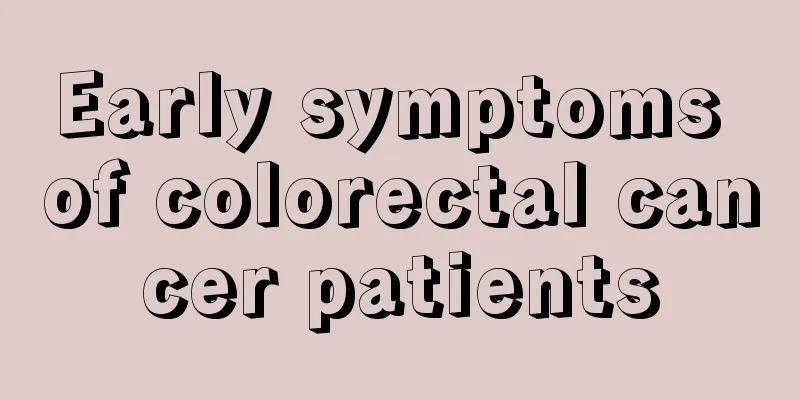Early symptoms of colorectal cancer patients

|
In the early stages of colorectal cancer, patients may experience some mild but important symptom changes, such as increased farting, unpleasant odor, increased gastrointestinal motility, etc. Understanding these symptoms can help detect them early and take action. 1. Increased farting and changes in odor Farting more often and becoming more pungent may be a sign of increased bacterial activity in the intestines. These changes are often associated with an imbalance in the intestinal flora, perhaps due to the effects of a tumor. Although farting is a normal physiological phenomenon, if you find that the changes are obvious and persistent, it is worth paying attention. 2. Increased gastrointestinal motility Changes in gastrointestinal motility may manifest as abdominal discomfort or increased borborygmus. This condition is usually caused by changes in pressure in the intestines or a tumor that affects the normal digestive process. If this phenomenon persists, it is recommended to consult 3. Changes in stool color and properties Darkening, black or red stools may indicate bleeding in the intestines. Changes in stool consistency, such as thinning or irregularity, may also be due to a tumor in the intestines that is blocking the normal bowel movement path. These symptoms require special attention and prompt medical attention. 4. Changes in bowel movement frequency A significant increase or decrease in the number of bowel movements may be a sign of affected intestinal function. Whether it is diarrhea or constipation, if it lasts for a long time, it may be related to colon cancer. Recording these changes in time and communicating with your doctor can help with early diagnosis. 5. Other related symptoms Early symptoms may also include mild abdominal pain or discomfort. Although these symptoms may be confused with other gastrointestinal problems, persistent abdominal discomfort warrants attention. A comprehensive judgment combined with other symptoms can more accurately identify the problem. To reduce the risk of bowel cancer, it is important to maintain a healthy lifestyle. Eating fiber-rich foods such as whole grains, fresh fruit and vegetables helps maintain a healthy gut. Regular medical checkups, especially colonoscopies, can help detect potential problems early. If you or someone around you has the above symptoms, don't take it lightly. Early detection and treatment are the key to improving the cure rate of colorectal cancer. Maintaining good communication with your doctor and undergoing professional examinations in a timely manner are important steps to protect your health. Remember, every signal from your body deserves to be taken seriously. |
<<: Will I have a fever after liver cancer surgery
>>: What are the pathological types of kidney cancer?
Recommend
Which hospital is good for kidney cancer in China
Kidney cancer, also known as renal cell carcinoma...
Can white wine be heated?
We often watch some ancient TV dramas. When some ...
Bone cancer patients may also have some hard lumps
Bone cancer patients may also have some hard lump...
I haven't eaten for a week and have severe chest pain in the late stage of lung cancer. How to treat it
When patients with advanced lung cancer do not ea...
Roasted pig's trotter calories
Pig's trotters are a very common food in our ...
What are the benefits of morning glory seeds
Speaking of morning glory, I believe many people ...
Is facial skin cancer contagious?
Skin cancer is a malignant tumor. In clinical pra...
What are the physiological functions of the liver
The main physiological function of the liver is d...
How long can you live if lung cancer recurs
How long can you live if lung cancer recurs? Lung...
Tips for those who can't sleep during the night shift
When everyone grows to a certain age, they need t...
What are the reasons for hair loss in teenagers?
When the body is in adolescence, hair loss should...
There are lines on the side of the thigh
Stretch marks are also called atrophy marks and s...
Understand the cause of malignant melanoma
Melanoma is a precursor to skin cancer, so everyo...
What are the symptoms of neuropathic pain
Neuropathic pain is pain caused by damage to the ...
The effect of white vaseline
White vaseline is an ingredient extracted from pe...









